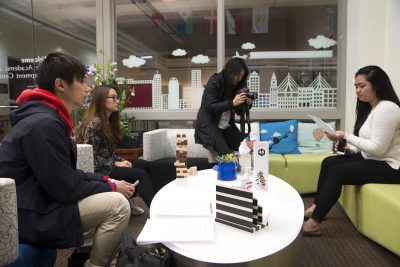
Three Boston University students created a video about food insecurity to raise awareness for the issue, an issue they said does not get enough attention.
The video, which was created for a class in the Questrom School of Business called “The Leadership Challenge” features BU students offering their perspectives on food insecurity. The video is part of the group’s larger initiative to contribute to a community service class project.
Group members said they aimed to convey that food insecurity is more than just not having reliable access to food. There are many other factors that go into it, and there are varying degrees of food insecurity, group member Judy Phyu said.
“All individuals have a different definition of food insecurity,” said Phyu, a Questrom senior.
Phyu said coming from different backgrounds, everyone’s perception of food insecurity is different.
“For example, someone in Jamaica Plain could be food insecure by not having food at all,” Phyu said. “For a BU student, food insecurity could be not having the time to get nutritious food.”
Phyu added that she hopes the project can teach people that food insecurity can affect anyone, not just impoverished communities.
“We want to let the BU community know that food insecurity is non-discriminatory, and more people around you are facing food insecurity than you think,” Phyu said. “It’s not just people who are hungry or homeless.”
Group member Reo Osawa, a junior exchange student in Questrom, said that food insecurity is a complex issue that cannot be defined clearly.
“Food insecurity doesn’t have a standard definition that works for everyone, [mostly] because different people have different kinds of food insecurities,” Osawa said. “So, we don’t have a standard definition. It’s more like a spectrum.”
Osawa added that efforts like his group’s can help to bridge the knowledge gap between low-income students on campus and their well-off peers.
“[We wanted to] start a discussion about these topics and how we are biased without actually knowing it,” Osawa said.
Once the group members chose food insecurity as the issue they wanted to tackle, they decided they wanted to do something imaginative and original, Phyu said. They reached out to the Community Service Center, which helped them refocus and hone their ideas into a viable and effective message.
“We realized that we didn’t want to volunteer at a soup kitchen or a food shelter,” Phyu said. “Instead, we wanted to work on something more creative that is a little more different than a usual community service project.”
Several students said food insecurity is a significant problem that many people are unaware of.
Hayley Walker, a senior in the College of Engineering, said she sees food insecurity as part of a bigger problem on campus.
“[High-income] people are ignorant of how [low-income] people live, in general,” Walker said. “I have several friends that have no idea [about food insecurity] because they have lived in a bubble their whole life.”
Jocelyn Power, a senior in the School of Education, said even though some BU students may struggle to find the resources to eat or buy nutritious foods, it is important to note the significant difference between that experience and the plight of lower-income students.
“It’s not quite the same situation as a person I would genuinely consider food-insecure,” Power said. “I have access to food anytime I want and, if I’m really in a pinch, I can call my mom and ask for money.”
Power said she thinks there is a lot that people can do to start fixing the issue of food insecurity locally.
“Learning about it and being aware is the best the school can do as a whole,” Power added. “Community service programs … [and] volunteering your time to the food bank [can also help].”
Yash Kothari, a senior in the College of Arts and Sciences, said he agreed with the group’s message because it resonated with his past experiences.
“I’m from Asia, and I’ve seen the highs of life and also the extreme poverty as well,” Kothari said. “Income is one part of [food insecurity], but your other capabilities also come into play, whether there is a place to get food around you or whether you are actually physically capable of getting food for yourself.”
Students can start making a positive difference even in the dining halls, Kothari said.
“[In the dining halls], I would see the amount of waste that would just be on the clean-up trolley,” Kothari said. “That’s just the most absurd thing for me because you take as much as you want and it’s basic rationality that you only take as much as you want to consume … [Ways to improve this] would be no wasting food, knowing where your food comes from and cooking for yourself more.”



















































































































John • Apr 28, 2017 at 4:14 pm
Great article!! Very Noté-worthy project to undertake to educate and empower the BU community